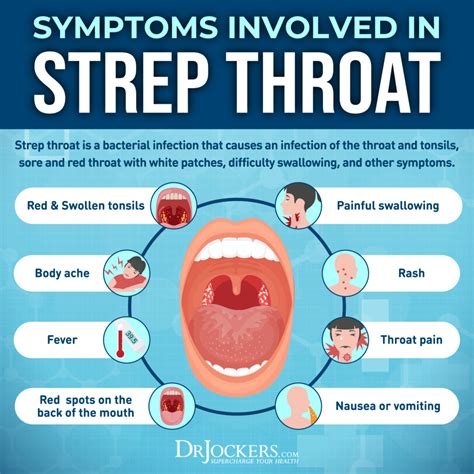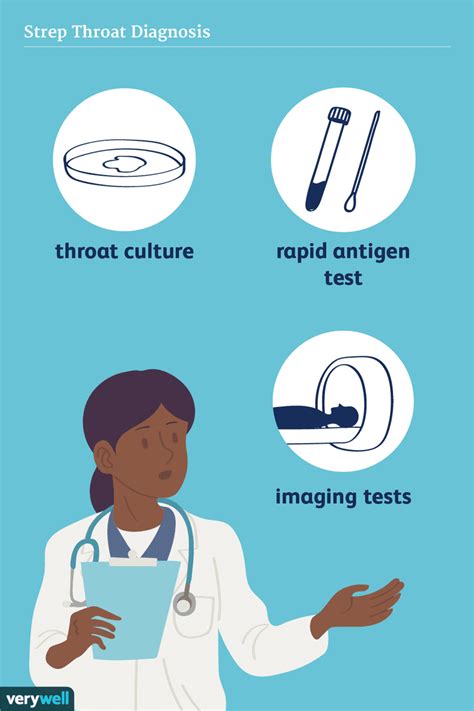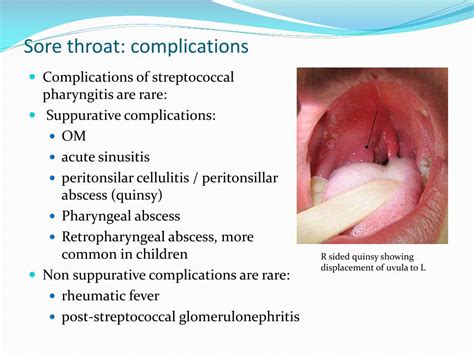Intro
Identify Strep Throat Signs, symptoms, and causes. Learn about throat infections, sore throat remedies, and antibiotic treatments to relieve painful strep throat symptoms.
Strep throat, also known as streptococcal pharyngitis, is a highly contagious bacterial infection that affects the throat and tonsils. It is a common illness that can affect people of all ages, but it is most prevalent among children and adolescents. Recognizing the signs and symptoms of strep throat is crucial for early diagnosis and treatment, which can help alleviate discomfort, prevent complications, and reduce the risk of transmission to others.
The importance of identifying strep throat signs cannot be overstated. If left untreated, strep throat can lead to serious complications, such as kidney inflammation, rheumatic fever, and abscesses. Furthermore, strep throat can also lead to significant discomfort, missed school or work days, and a decreased quality of life. By understanding the common signs and symptoms of strep throat, individuals can seek medical attention promptly, receive effective treatment, and make a swift recovery.
Strep throat is typically caused by the Group A Streptococcus bacterium, which is highly contagious and can be spread through close contact with an infected person, contaminated food and drinks, or touching surfaces that have come into contact with the bacteria. The incubation period of strep throat is usually between 2 to 5 days, and the symptoms can range from mild to severe. Some people may experience a mild sore throat, while others may develop severe symptoms, such as difficulty swallowing, fever, and swollen lymph nodes.
Understanding Strep Throat Signs and Symptoms

Common Strep Throat Signs and Symptoms
Some of the most common signs and symptoms of strep throat include: * Severe sore throat * Swollen and tender lymph nodes * White patches on the tonsils * Fever over 101°F (38.3°C) * Headache * Stomachache * Nausea * Vomiting * Loss of appetite * Fatigue It is crucial to seek medical attention if you or your child experience any of these symptoms, especially if they are severe or persistent.Diagnosing Strep Throat

Laboratory Tests for Strep Throat
Laboratory tests, such as a rapid strep test or throat culture, can help confirm the diagnosis of strep throat. A rapid strep test involves swabbing the throat and tonsils to collect a sample, which is then tested for the presence of Group A Streptococcus bacteria. This test can provide results within minutes, but it may not always be accurate. A throat culture involves swabbing the throat and tonsils and sending the sample to a laboratory for analysis. This test can take 1 to 2 days to provide results, but it is more accurate than a rapid strep test.Treatment and Management of Strep Throat

Home Remedies for Strep Throat
Some home remedies can help alleviate strep throat symptoms, such as: * Gargling with salt water to reduce swelling and kill bacteria * Drinking warm liquids, such as tea or broth, to soothe the throat * Using a humidifier to add moisture to the air and relieve congestion * Taking over-the-counter pain medications, such as acetaminophen or ibuprofen, to reduce pain and fever * Eating soft, easy-to-swallow foods, such as yogurt or scrambled eggs, to reduce discomfortPreventing Strep Throat

Good Hygiene Practices to Prevent Strep Throat
Some good hygiene practices to prevent strep throat include: * Washing hands frequently with soap and water * Avoiding close contact with people who have strep throat * Not sharing food, drinks, or utensils * Covering the mouth and nose when coughing or sneezing * Avoiding touching the face, especially during cold and flu season * Cleaning and disinfecting surfaces and objects that may have come into contact with the bacteriaComplications of Strep Throat

Potential Complications of Untreated Strep Throat
Some potential complications of untreated strep throat include: * Kidney inflammation * Rheumatic fever * Abscesses * Sinusitis * Ear infections * Meningitis It is crucial to seek medical attention if you or your child experience any of these complications, as prompt treatment can help alleviate symptoms and prevent long-term damage.Conclusion and Next Steps

We encourage you to share this article with friends and family to raise awareness about the importance of recognizing strep throat signs and symptoms. If you have any questions or concerns about strep throat, please comment below, and we will do our best to provide you with accurate and helpful information.
What are the common signs and symptoms of strep throat?
+The common signs and symptoms of strep throat include a severe sore throat, swollen and tender lymph nodes, white patches on the tonsils, and a fever over 101°F (38.3°C).
How is strep throat diagnosed?
+Strep throat is typically diagnosed through a physical examination, medical history, and laboratory tests, such as a rapid strep test or throat culture.
What are the potential complications of untreated strep throat?
+The potential complications of untreated strep throat include kidney inflammation, rheumatic fever, and abscesses. It is essential to seek medical attention if symptoms persist or worsen over time.
